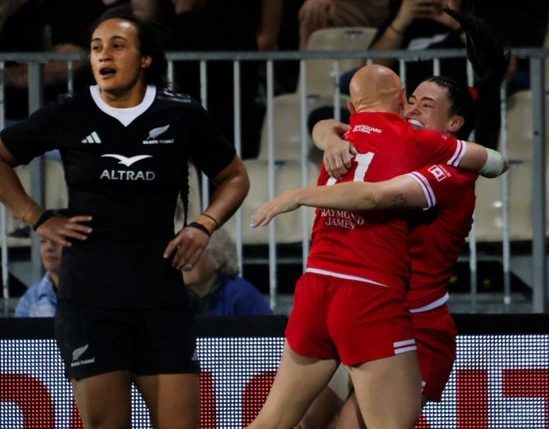Now we know the four teams: Canada, England, France and New Zealand. Cynics will say they’ve known them for years.
Sadly they’re right, but there’s no short cut to glory.
Each of the four has its own approach to these final stages. Once again in alphabetical order:
Canada was the union to place its cards most firmly on the table. Their objective is to win the trophy, nothing less. Kevin Rouet has assembled a formidable squad.
England’s position is curious: Two wins in nine attempts is a poor return. Time and again they gave fallen at the final fence. Now all is -theoretically – in their favour: one loss in 62 matches, home advantage and an expected crowd of 82,000 hollering for them. Easy peasy? I don’t think so. There’s many a slip…
France’s position is even odder. They have yet to reach a final despite reaching eight semis.
Their intention was a clear as Canada’s, though less explicit: win a first trophy.
Recent events (the shot in the arm) have rocked the boat. Will it have stabilised in time?
A maximum of 4.6 million viewers watched the France-Ireland game. They will be hoping against hope for a similar result on Saturday.
New Zealand: the cup has been their preserve as if by divine right. Six wins out of nine is a great achievement. But in the last two years they have become aware of their fallibility. They have lost to all the other semi- finalists.
They are one team to have lost a major player to injury, Amy du Plessis. The nation is praying hard.
A broader look
For the first time head coaches will be picking their strongest squads. The only variations may be according to perceived opposition strengths and playing styles.
As the teams are announced (England’s on Thursday morning), we will be able to look back and see how the selectors have built towards their ideal side. First was the need to give all 32 players a run-out. Now other conditions apply.
A reminder of the fixtures:
Friday 19 September
Canada v New Zealand KO 19.00 BST
Saturday 20 September
England v France KO 15.30 BST
Both matches at Ashton Gate, Bristol.
That gives the winners of the first game a few more hours to recover from knocks and bruises. It is the game drawing the closer attention, second ranked against third; the pretenders to the crown versus the champions.
To my mind the Canadians are the more complete team. Critics have found weaknesses in the BFs’ play, notably up front. Their game against South Africa was unusual. Swys de Bruin placed full responsibility on his pack. This gained them an early lead that they couldn’t maintain. But their efforts will have taken a lot out of the defenders. Just how much, time will tell.
Rouet will be well aware of the threats coming from the Kiwi backs. But his pack should gain dominance. If their backs can keep reasonable control, they should take the day.
The England-France game, 1st v 4th, is easier to predict.
If the French pull off a great victory, it will be their first since Jessy Tremoulière scored a last-minute try in Grenoble in 2018.
They have come painfully close since then, but those recent events have tilted the balance heavily against them.
If they fall apart in disarray, we will understand; if they overcome their travails, it will count as one of their greatest triumphs ever.
According to many French observers a central problem has been selection; far too many changes of personnel and positions.
Exactly the same with England, you might say. The difference lies in the range and quality of choice available to English selectors.
At their last meeting in France England ground out a pack-based win. Mitchell’s aim will surely be a return to the fast open style that marks the Red Roses at their best.









